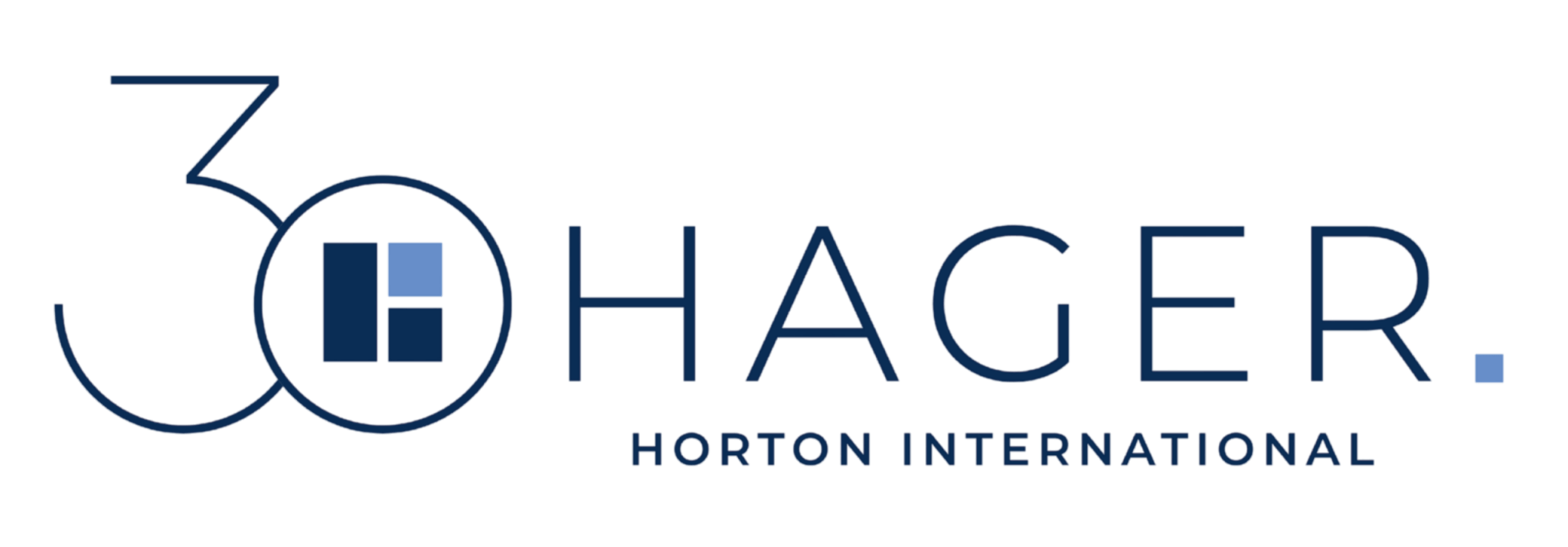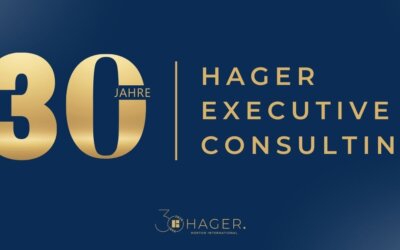
Sometimes a step backwards is the best move forwards. Daniel Kutschenko has followed an unusual career path. After working for Procter & Gamble and a strategy consultancy, he now heads up the IT Services & Operations business unit at HAGER. A conversation about his love of people’s business, GenZ’s value compass and why we won’t be able to overcome the skills shortage without women
You like to use a picture for your job. You see yourself as a ‘marriage counsellor for managers’. Please explain…
I think there are a few interesting parallels between recruiting and private life. Basically, it’s like this: If you’re with the wrong person, it drains your energy. It’s not constructive, you fall short of your potential. I see my role as listening to the client and finding out what they really want. It’s the same with the candidate. And then it’s about bringing the right people together for the longest possible partnership, a partnership with substance. I am convinced that if you put these pieces of the puzzle together and place people in an environment that is good for them, then they can develop further. It’s not about going for the cheap effect like Tinder and quickly placing someone. That’s not how we work.
You are a career changer in personnel consulting. What attracted you to the role?
I have to take a broader view. My father used to work for an American pharmaceutical company in human resources. As a family, we travelled abroad a lot as a result. And as is the case with family dynamics, I wanted to do everything, but not HR – even though I am relatively similar to my father and have the diplomatic and empathetic nature that you need for this job. I deliberately wanted to take a different path and, after studying business administration, I went in the direction of marketing. I did an internship at L’Oréal and Procter & Gamble and started at P&G after graduating. I found it exciting to look after these big, glamorous brands that inspire so many people and to create marketing concepts based on consumer insights.
Today, looking back, this interest in people and their psychology was also there, which helps me in my job today. After another stint at a strategy consultancy, I finally ended up at HAGER.
That sounds like a tough cut…
It was. As far as the position was concerned, it was actually a step backwards at first, both in terms of the title and the salary. I was 33 at the time and about to become a partner at the previous consulting firm. But, as the saying goes: ‘There’s no right life in the wrong one’. So a good six years ago, I was in onboarding at HAGER, sometimes with 18-year-old dual students. Nevertheless, I was convinced that it was the right step. I then rose through the ranks quite quickly, first becoming team manager and then taking over the IT Services & Operations business unit two years ago. A lot has happened since then. The unit comprises 12 people, with nine new employees joining in the last two years alone. It’s quite a young, very diverse team, Operations is a broad field and offers enormous development opportunities. It’s great fun here.
Looking back, many things make sense. To what extent was your first career a good preparation for your current role in executive search?
The exciting thing about HR consulting is that there are so many ways to get there. You can also see that in our leadership team. There are many career changers, which has the advantage that they have a track record in their industry. In my case, there are two things that help me in my work today. Firstly, I have dealt with recruitment consultants several times in my career. I know it from both sides, I can empathise with the candidates and the clients. In other words: I know how not to do it. On the other hand, Procter was a very good school. I had a lot of contact with market research. We had ‘Meet your consumer events’ every week, where we could interview people ourselves.
I have learnt to listen carefully and find out what is important to the other person. And then there is another crucial point that changed my perspective on things. The strategy consultancy that I moved to after Procter and that we set up was not a great success, despite great expectations and promising forecasts. It simply didn’t go through the roof. That means I can appreciate in a completely different way that there is a huge demand for what I do today. The shortage of skilled labour will continue to occupy us intensively over the next few years.
It must be this purpose that everyone is talking about. No, seriously. How do you know you’re in the right place?
You have a different attitude towards work. You could also say: you’re really drawn to it, you seek out work, it’s not an inconvenience. And of course it also helps that we work in the people business. We don’t sell network cables. We look after people. I would even go so far as to say that we have an influence on people’s lives. We can ensure that they have to travel less in their new job and are given more responsibility. Whatever is important to them to make them happier. That has a great purpose.
We are currently undergoing a major, comprehensive transformation. What are the major drivers and topics that you are dealing with?
Of course, the omnipresent topic of recent years has been digitalisation and automation. Corona has also provided a digitalisation boost for several years. After a brief period of restraint, the order situation has really picked up since February 2021. There were many projects that had previously been put on hold and then had to be implemented quickly. There was a huge backlog. Many, many positions had to be filled, which further exacerbated the existing skills shortage. If you look at the topic of cybersecurity alone, the way these stocks are performing even in a difficult stock market is remarkable. This will not change for the next few years.
In the manufacturing industry, I see the linking of OT and IT as a major topic for the future. Another important aspect is resilience as an organisation in times of multiple crises. Building flexible and robust supply chains, for example, is an issue in which digitalisation and specifically the use of data is indispensable. And finally, unsurprisingly, sustainability is becoming increasingly important for candidates from the GenZ generation. During the application process, they ask specifically about the sustainability strategy and can no longer be fobbed off with empty phrases.
Purpose is indeed an important factor in the search for talent. What other specific values and topics are particularly important?
There are revealing figures on this; one statistic [source: ConeCommunications; https://conecomm.com/2016-millennial-employee-engagement-study/], for example, states that 63 per cent of respondents could not imagine working for a company without a social purpose. There is a great need for meaningfulness, and this is of course also reflected in the choice of job. People are no longer loyal to their employer, but to their own values. If the employer offers a good platform for this – great. Incidentally, people are happy to work more than nine-to-five. The larger companies and consultancies have already adapted to young talent and their needs. In smaller and medium-sized companies, especially if they are family-owned or patriarchal, there are still some problems. It’s a real clash, although these companies in particular are often very value-based and down-to-earth. I think this is chronically underestimated. Moderating between these two groups, supporting this integration process, is an incredibly exciting role.
What criteria do you use to recruit employees? So: How does a recruiter recruit?
We now have more women than men in my team. Now we sometimes think: we should hire men again (laughs). One thing we have had very good experiences with is dual students. They are there for three or four years, learn the job from the ground up and are given responsibility and involved in decisions at an early stage. We don’t differentiate between the two. It also takes time, yes, to look after these people. But in the end, it’s very well invested. We have also had good experiences with trial working days. This allows both sides to get to know each other better and develop a feeling for whether it’s a good fit. Of course, things are different at senior level, where a lot happens via the leadership team’s respective networks.
We touched on the topic of leadership shortages at the beginning of our interview. There is an exciting ‘Handelsblatt disrupt’ podcast with Monika Schnitzer, Chairwoman of the German Council of Economic Experts. She describes three ways in which the shortage of skilled labour can be addressed: More women in the labour force, more immigration and more automation. Where do you see the greatest leverage?
I also listened to the podcast. It’s actually very interesting. All three levers are important, albeit very different. Let’s start with number 3, automation. That’s a bit of a double-edged sword. On the one hand, you have the effect that automation and digitalisation can mean that you no longer need a driver. At the same time, however, we can see that the UK is desperately looking for lorry drivers as a result of Brexit. Headhunters are currently receiving a higher fee for a lorry driver than for an IT expert. Another example: The Federal Employment Agency has such an ageing workforce that it will not be possible to replace all the employees who are due to retire. There will inevitably be a redesign of processes through digitalisation and automation. This will even increase the shortage of skilled labour in the tech sector in the short term. We need more cybersecurity experts, cloud architects and SAP consultants.
I also find the topic of skilled immigration very exciting. You would need 1.5 million people per year in gross terms, who enter the country with grandma and baby, in order to achieve a net labour force of 400,000. However, this raises the question of where the labour force would come from? Other European countries are struggling with similar problems to ours in terms of birth rates. In my view, the attempt to bring more women into the labour force has the greatest leverage. However, a lot has to change to achieve this, from the culture to the infrastructure.
You have two children. How do you handle this in your family?
Our sons are two and six years old. My wife works full-time and has a global role at Pepsi. Since coronavirus, at least the long business trips to the USA have been cancelled and a lot of things are now done by video call. That helps a bit. Apart from that, we try to divide up the care work as much as possible. Of course, juggling a job and children is not always easy. I was very moved by an anecdote two years ago at Christmas, because it shows that this commitment is worthwhile. Our then 4-year-old son was asked by his grandma: ‘What do you want to be when you grow up? He didn’t say firefighter or policeman. He said: ‘I want to be a dad.



